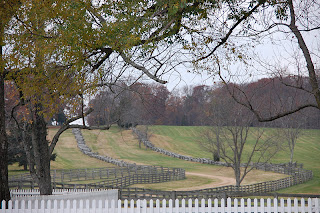The Tuskegee Institute, as his endeavor became known, was built by its students, brick by brick. Washington taught that physical labor was just as important as mental labor...it created ownership and taught its own lessons and respect for the end result. This man who at one time had been the water boy for field hands on a tobacco plantation went on to become the father of economic and educational hope for the African-American community following the Civil War. He advised three presidents and gave countless speeches across the nation. And he did all of this before his premature death at the age of 59. We were really blessed by the irony of meeting a Tuskegee graduate...the park volunteer, his first day on the job. He and his wife (also a Tuskegee graduate) have retired to the area and are plugging in to give back and stay active. Meeting Mr. Head, a retired teacher, added so much to our visit at the Booker T. Washington National Historic Site.
We made one more stop on our drive to Charlottesville...Appomattox Court House, where the Civil War was ended by Lee's surrender to Grant. The ironies here: it ended four years to the day after it began; and it ended on property belonging to Wilmer McLean. He had lived on land in the Manassas area and was witness to the first major battle. In an effort to escape its horrible destruction, he moved his family to a tiny village, the county seat and therefore location of the courthouse: Appomattox Court House. McLean was one of the few people still in residence when the Union and Confederate armies had their final confrontation just miles away. When Lee, through an assistant, took the first steps toward surrender by requesting a meeting with Grant, the reply was for him to find an appropriate place. Lee's assistant believed the nearby village might have a suitable building...but the only person to ask was McLean, who offered his home. What are the chances that the War's circle was started and reached its end with McLean? Unbelievable.
We were very moved to learn of the respect and compassion offered to Lee and his troops during the surrender; Grant stepped out of his destroy-at-all-costs mode, writing terms that allowed the Confederate soldiers to return home with their horses and providing transportation and food. Upon Lee's departure from the McLean home after signing the documents, he received a silent salute from the Union troops and Grant. A manual printing press was hastily put to work, and after 48 hours of non-stop production, more than 30,000 parole passes had been printed, granting the rebel soldiers safe passage to return to their homes in the south.
Our day surprised us with its connections...a lot to chew on this evening. Tomorrow, the jewels of Charlottesville: Monticello and Ashlawn-Highland, the homes of Presidents Jefferson and Monroe.
Photos:
(1) The plantation on which Booker T. Washington was born.
(2-3) Kendall was particularly fond of Rusty, one of the farm's more personable residents.
(4) Our new friend, Mr. Head
(5) Wilmer McLean's home in Appomattox Court House
(6) The parlor in which the terms of surrender were negotiated
(7) Clover Hill Tavern, in which the parole passes were printed
(8) road coming into the village...the Confederate soldiers arrived by it for a very meaningful ceremony called Stacking the Arms...their bayonetted muskets were placed upright, leaning on each other, and draped with the Confederate flag. Soldiers on both sides of the conflict were crying...four years of unimaginable carnage were over, and the men could once again reach across and call each other "brother."
 |
 |
 |
 |
 |
 |
 |

No comments:
Post a Comment